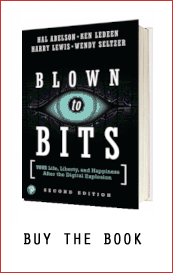Excerpts from Chapter 6: Balance Toppled‚ Who Owns the Bits?
Automated Crimes, Automated Justice … NET Act Makes Sharing a Crime … The Peer-to-Peer Upheaval … Sharing Goes Decentralized … Authorized Use Only … Forbidden Technology … Copyright Koyaanisqatsi: Life Out of Balance … The Limits of Property
Tanya Andersen was home having dinner with her eight-year-old daughter in December 2005 when they were interrupted by a knock at the door. … The Recording Industry Association of America (RIAA) … claimed that the Oregon single mother surviving on disability payments owed them close to a million dollars for illegally downloading 1,200 tracks of gangsta rap and other copyrighted music. … The RIAA knows that the process is flawed, but given their stake in stopping downloading, they see no choice. Not only are they seeing their products being distributed for free, but they themselves might be liable to lawsuits from artists for neglecting to protect the artists’ copyrights. Explains Amy Weiss, RIAA Senior Vice President for Communications, “When you fish with a net, you sometimes are going to catch a few dolphin…..” Besides Andersen, other snared “dolphin” included a Georgia family that didn’t own a computer, a paralyzed stroke victim in Florida sued for files downloaded in Michigan, and an 83-year-old West Virginia woman who hated computers and who, as it turned out, was deceased. …
The Grokster ruling cited “advertising an infringing use” as evidence of an active step taken to encourage infringement. Apple introduced the iTunes desktop with its CD-copying software in 2001. Early advertisements heavily promoted the product with the slogan “Rip, Mix, Burn.” Was that a demonstration of Apple’s bad intent? Many people certainly thought so, including the Chairman of Walt Disney when he told Congress in 2002, “There are computer companies, that their ads, full-page ads, billboards up and down San Francisco and L.A., that say‚ —what do they say?—‘rip, mix, burn’ to kids to buy the computer.” Can your company risk introducing a product with that slogan in the post-Grokster era? You might expect that you would have every chance of winning an “intent” fight in court, but the risks of losing are catastrophic … guessing wrong is a bet-the-company mistake. …
Some say that the [Digital Millennium Copyright Act] is necessary. Others claim that it has been largely ineffective in curtailing infringement, as the continuing calls for ever more severe copyright penalties demonstrate. But whatever its merits, the anti-circumvention approach is poisonous to the innovation that drives the digital age. …
Getting off that path requires freeing ourselves of old ideas and perspectives. Difficult as that seems, there are grounds for optimism. During 2007, the recording industry made a major shift away from reliance on digital rights management. … When Jobs made his February 2007 proposal, Warner Music CEO Edgar Bronfman flat-out rejected the idea as “completely without logic or merit.” Before the end of the year, Warner was announcing that it would sell DRM-free music on Amazon … .

